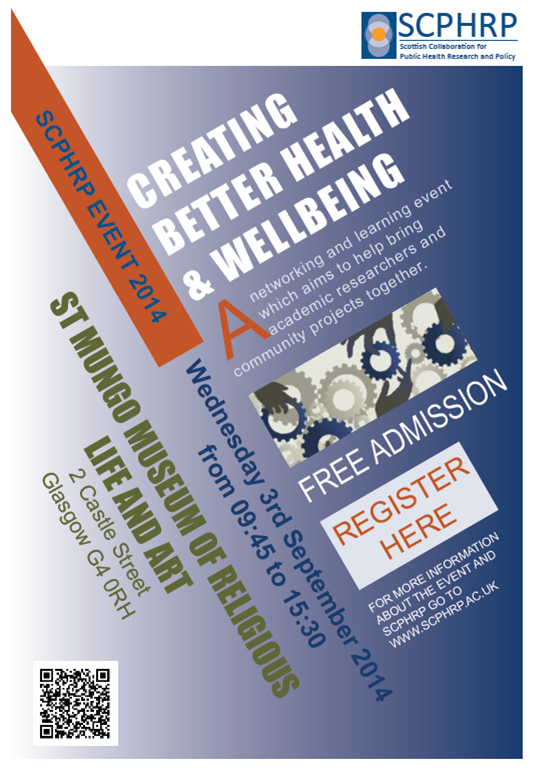
#CreateHealth2014
The report and video from this day are available here: http://www.scphrp.ac.uk/creating-better-health-wellbeing-event-report-video/
This one-day networking and learning event organised by members of the Adult Life/Working Age Working Group at the Scottish Collaboration for Public Health Research & Policy (SCPHRP) aims to help bring academic researchers and community projects together to discuss methods and experiences of improving health and wellbeing and reducing health inequalities in Scotland. The main objectives for the day are:
• Showcasing some on-the-ground work
• Improving understanding between community organisations and researchers
• Increasing the likelihood of future connections between academia and community organisations
The discussions and outcomes of the event will be recorded with the aid of a graphic recorder and will be disseminated to policy, practice, research and the general public.
This sold-out event promises to be an exciting and vibrant discussion between community organisations and researchers.
For more information about SCPHRP and the Working Groups please go to:
http://www.scphrp.ac.uk/working-groups/
Schedule
10:00 Registration with tea/coffee
10.20 Welcome and introduction to the day (Tony Robertson, SCPHRP)
10.25 Who’s who (networking)
10.40 Keynote: ‘Community-based action research – a mechanism for longer term change?’ (Sandra Carlisle, University of Aberdeen)
Community participation in health improvement projects is generally seen as a worthwhile aim. However, some communities now suffer from research and initiative ‘fatigue’, whilst community health and wellbeing projects tend to be underfunded and insecure, or short term, yet still expected to make lasting differences to local lives. Sandra Carlisle will speak briefly about the knowledge and experiences gained from the six year Sustainable Health Action Research Programme (SHARP) in Wales, which has similar patterns of health inequality to Scotland. SHARP was designed to test action research as a way of learning from community based partnerships about what works (or not) in improving health and wellbeing in disadvantaged places and groups, through action on the social determinants of health. The focus of the programme lay on compiling evidence in order to influence policy and practice.
11.15 Small group case-study discussion groups
We have enlisted the help of several projects/organisations that have experience of successful researcher/non-researcher collaborations to lead discussions of people’s experiences and expectations from such collaborative working. Participants will be invited to select one of six case-studies to join, with the key discussion points being:
- What works / could work well in these partnerships?
- What does not / might not work well in these partnerships?
- Openness to / concerns about getting involved in such partnerships?
Case-studies include:
- CHANGES Community Health Project / SCPHRP – Eat Well / Keep Active (nutrition and physical activity short-course)
- Healthy Valleys – Grassroots Project (family support programme)
- Lanarkshire Community Food and Health Partnership / University of Glasgow – Improving health and reducing health inequalities through better food access and healthy eating
- Nari Kallyan Shangho – Changing Cultures: Health and Inequality in Edinburgh (South Asian women’s experiences of inequality)
- SCPHRP – Evaluating Alcohol Brief Interventions (ABIs) in Youth and Social Work Settings (alcohol reduction programme)
- Sustrans Scotland – Community, school and workplace Initiatives to encourage individuals to use the outdoor environment for physical activity
12.15 Lunch
13.00 Post-lunch energiser
13.10 World Café: Exploring the research process
- Starting (Tony Robertson, SCPHRP)
- Keeping it going (Sue Rawcliffe, Community Food & Health Scotland/NHS Health Scotland)
- Evidence (Sandra Carlisle, University of Aberdeen)
- Reporting (Michelle Estrade, SCPHRP)
- Impact (Elspeth Gracey, Community Health Exchange/Scottish Community Development Centre)
14.25 Tea/Coffee
14.40 Feedback from the World Café session
15.00 Plenary (Ian Shankland, Lanarkshire Community Food and Health Partnership, and Garth Reid, NHS Health Scotland)
- What have we learned from today?
- What steps can we take next?
15.30 Close
——




